Your Excellencies, Dear Ladies and Gentlemen,
First of all, I would like to express my warmest thanks to Prof. Krasnodębski, Prof. Legutko and the selection committee of the medal for ‘Courage and Integrity’ for the great honour you have bestowed upon me today on the occasion of the conference ‘Polska Wielki Projekt’, and to Olivier Bault for his kind and touching Laudatio. I feel extremely honoured by this sign of recognition for my work, and when I think about the fact that only some years ago, the late Sir Roger Scruton was distinguished with this same medal, it is not false modesty when I would like to emphasise that I do not really deserve this prize, or at least only with certain reservations.
Therefore, I would like to mention first all those without whom I could hardly have accomplished my task: My colleagues here in Poland for their kind support, especially Dr Justyna Schulz from the ‘Instytut Zachodni’; my Polish media partners such as ‘TVP’, ‘Radio Polskie’, ‘Gazeta Polska’, ‘TVP World’, ‘Ordo Iuris’ or ‘Deliberatio’ for the lively exchange I had with them; my friends in Warsaw for many endless conversations about the situation in the country; and of course the media in which my texts were published, above all ‘Cato’, ‘Tichys Einblick’, ‘Junge Freiheit’ and the ‘Tagespost’, but also ‘Radio Courtoisie’, ‘TV Libertés’, the ‘Journal du dimanche’, ‘Disidentia’, the ‘Tribuna del Pais Vasco’, ‘El Correo de España’, the ‘European Conservative’ and the ‘Spectator’ – and should I have forgotten anyone, I apologise sincerely.
Of course, I have tried hard in recent years not only to honour and defend our European civilisation, but also to report on Poland in the non-Polish, especially German, but also French, Spanish and English media in a way that I myself believed to be truthful to the best of my knowledge and which, it seems to me, contradicted in many ways the image conveyed by the mainstream media. But actually I am anything but an expert on these issues and ended up rather by coincidence in a role that is not really mine and should never have been mine if it had not turned out that I was one of the few who wanted to play it at all. To this day, I have paid a high price for my decision to get involved in a fight for which I was extremely ill-equipped, but looking back, I regret none of what I said or wrote. After all, the fight I waged in and for Poland was ultimately also a fight for what has always been closest to my heart: Western civilisation. And this brings us to the real content of this short speech.
Even if it has been somewhat overlooked in recent years, I am actually not a journalist, but a university professor; not a writer of daily articles, but a philosopher of history; not a politician, but a scholar; not an active, but a contemplative person. From childhood on, I have been most fascinated by the incredible diversity and beauty with which people have tried to express the idea of transcendence and to understand God, humanity and nature in their own specific and inimitable way through the various great civilisations. If I were to show you around my library today, you would see that it is considerably better stocked with literature on ancient China, classical antiquity, Egypt, Islam or the Maya than on Europe, and I probably spend considerably more time trying to understand Buddhist thought, Chinese garden design, Egyptian architecture or Greek political thought than reading books on contemporary history. While the latter may indeed sometimes sharpen my political analysis, only the former provides me with the fundamental broadening of my horizons that I have been striving for for decades.
What does all this have to do with the portrayal of Poland in the media, you may ask impatiently - and you are absolutely right to do so. Well, I am convinced that all great civilisations are equally valid and valuable paths to the one supreme goal which is the knowledge of transcendence, and I learn an incredible amount from studying these civilisations every day, not only about so-called ‘exotic’ perspectives on the main questions of our lives, but also about the blind spots of our own civilisation. But at the same time, I love my own European civilisation more than any other and would like to maintain and defend it in a privileged way. Why this is by no means a paradox, I explained in detail in a speech I gave a few months ago at the ‘National Conservatism’ conference; so here, I will just say, first, that even universal human love does not diminish the special responsibility that one owes to one's immediate neighbour and to the ‘ordo caritatis’, second, that ultimately only one's own civilisation is the one that we can fully understand and can develop further, and third, that I am convinced that by bringing us into the world as Europeans, God has also given us the task of nurturing this specific civilisation.
My particular love for Europe – and as you can imagine, I am talking here about the true Europe, not about what the European Union has done to this ideal – also has another reason. As you know, I am Belgian, so for this reason alone I have a very weak national identity; but it gets even worse: I belong to the minority of German-speaking Belgians, which numbers just 70,000 people and, unlike other minorities, has never had a strong regional identity of its own, such as Alsace, Corsica or Brittany, but is purely a product of historical chance. This means that it was extremely difficult, if not impossible, for me to establish a genuine regional or national identity. In fact, these would have been the ideal conditions for me to become an uprooted, globalised, left-wing liberal cosmopolitan, but I turned out differently: living at the intersection between German, French and, to a certain extent, Burgundian-Lotharingian identity, I have discovered European civilisation as a genuine, so to speak ‘national’ fatherland; that is, as the identity that unites and transcends my own often contradictory identities more or less harmoniously and meaningfully. In a sense, I have become a ‘European nationalist’, if we may naively use the word ‘nationalist’ here in its original sense: Europe in its entirety is for me what would be the ‘nation state’ for others, and this true patriotic commitment to the idea of ‘Europe’ is something that I have called ‘Hesperialism’ in order to distinguish it from the fake ‘Europeanism’ preached by Brussels.
This European nation is, of course, threatened everywhere, and thus we are also gradually approaching an explanation of what brought me to Poland. On the one hand, I freely admit that one of the reasons was a certain sense of adventure: after 10 years of working as Chair for Roman History at the University of Brussels (ULB), I desired to experience something completely different. On the other hand, my decision to migrate to Poland was also due to the fact that my activities had increasingly shifted from pure ancient history to political analysis, and that the ‘Instytut Zachodni’ was an interesting employer, as it wanted me to deal with European politics from a civilisational and identitary standpoint. But in the background, there was also the realisation that Belgium, my home country, had completely embarked on a path of cultural self-destruction, while in Poland, an exciting experiment in pro-European, Christian, social and conservative government was taking place, in which it seemed extremely honourable and meaningful for me to participate. Need I add that it was also an extremely attractive prospect for my family to spend a few years in a country that in many respects offered more ‘normal’ living conditions than my own homeland? A strong middle class, a society still largely shaped by Christianity, an extremely homogeneous population, a certain optimism about the future, excellent economic prospects, very low crime rates, a certain serenity in interactions with one another – all of this may seem like an ‘everyday’ banality from a Polish perspective, but in Western Europe, it has already become the absolute exception.
When coming here, I had originally declared that I did not want to deal with immediate Polish day-to-day politics in my work, but only with European questions. But as fate would have it, I was increasingly contacted by German and French media outlets as a local point of contact to comment on individual developments. At first, I was a bit reluctant. For one thing, I am anything but a specialist in the contemporary history of Central Europe; for another, I was never able to learn Polish to the extent that would have been necessary, as the workload since my arrival was simply too great. But I gradually allowed myself to be persuaded to answer the questions put to me to the best of my knowledge, because I quickly realised something that I would never have thought possible before: I was and am actually one of the few non-Polish-born essayists who has ever tried to develop a constructive understanding of the former Polish government and to express it publicly. At first glance, this may seem surprising, as there is no shortage of much more competent Polonists, journalists and political scientists in Western Europe. However, it quickly became clear to me that they either did not comment at all or only rarely on critical topics, or were permanently employed by those media outlets that were ideologically clearly sympathetic to the then left-wing liberal opposition, which is now in government. In other words, if I did not comment on certain topics, no one else would, and the Western European readership would have to get their knowledge about Poland from sources that were clearly anti-conservative. That was the deciding factor for me.
Accordingly, and besides my academic work as a historian of past civilisations, I have tried over the last six years to critically follow political events, at least as far as I understood them and as far as they could interest a Western European public, although my main interest lay always in the questions that touched on my core concerns: namely, the manifold internal and external threats to our European civilisation, which could be seen in an exemplary way here in Poland, where the resistance had not yet been completely silenced. If I look back on these last 6 years, I am myself astonished by the amount of my own production: I published 6 monographs, 13 books (not counting the translations), a hundred scholarly papers, and around 800 papers or interviews for the large media.
In retrospect, it was inevitable that I would make many enemies, especially in the German media. Until I moved to Poland, I may have been occasionally regarded as a ‘conservative’ thinker in the media there; however, my refusal to participate in the widespread demonisation of the outgoing Polish government and my attempt to endorse its general programme of Christian, social and cultural renewal for Poland and all of Europe, however much one may legitimately dispute the quality of its implementation, has not been forgiven.
I was thus called an ‘advocate of dictatorship’, and since this, like other warning shots, was not enough to silence me, the attributes have become more and more extreme, so that now, in Germany, I am, believe it or not, counted among the ‘thinkers of the extreme right’ and have suffered corresponding reprisals, although my fundamental positions have never really changed since I started writing and although the ideals I defend correspond, I believe, to what well-educated Europeans have been able to agree on for several centuries, even millennia, without much discussion. I have never wanted to polarise, and I have always tried to avoid extreme opinions. Venerating God, loving the European civilisation, caring for the nation state, being proud of the efforts of our forefathers, protecting the family, respecting the complementarity between man and women, being helpful to our neighbour, defending our freedom, being tolerant of other opinions, in short, being chivalric and striving for what is Good, True and Beautiful – all this has always seemed eminently supra-political to me, but I fear that nowadays, even these innocent ideals have become more and more contested and defamed, especially by the ideology of wokeness. Hence, it was not always easy to bear the malicious and unjustified criticism of certain journalists and alleged experts without complaint, but at least, I experienced first-hand how partisan, unfair and even mendacious many of those media outlets have become that were considered the epitome of objective neutrality just 20 years ago – a sad but important lesson.
During these years, Poland has become very dear to me, not only as a bastion of European identity, but also as a country in itself, which from now on, no matter what may happen, will represent an important part of my life. The kindness of the Polish nation, its magnificent cultural past, its almost immeasurable political resilience against foreign rulers and much more have significantly expanded and corrected my previous view of Europe, which was essentially limited to the Franco-German dimension. And Poland has not only become part of my history, but also of that of my three sons. The two oldest have not only become bilingual, but also trilingual in these years and therefore speak perfect Polish, and in many ways know and understand this country considerably better than the one they actually come from; and our third son has even been born here in Poland and considers this country as his true home country, as ‘his’ Poland, as he says.
Despite everything, however, it must also be understood that the fight of the last six years has essentially been lost, at least for the time being. And by that I mean not only the specific question of parliamentary majorities and governing parties, but also the general situation of the country. Because even to me as an outsider, it has not remained hidden how much Poland has changed since I have been living here, and not only for the better.
The commitment to Christianity is in free fall, the demographic situation is increasingly catastrophic, the glorification of everything that is ‘Western’ is highly questionable, and knowledge of one's own identity is steadily diminishing. Hedonism, materialism, atheism, globalism, Americanisation, gender ideology, cheap moral activism – all of this has increased rapidly in the few years that I have been here, and it is not to be assumed that this trend will be reversed in the near future. At the same time, the gradual perversion of the European Union has led many people on the political right to abandon the ideal of a common European civilisation-state and to focus entirely on sovereignism and the nation state, which in my view is nearly an error as big as the abstract multiculturalism and globalism preached by the Brussels technocracy. Hence, Poland is about to fall into the same trap that my own country was caught in two or three decades ago, and all warnings are falling on deaf ears, it seems to me: apparently all European countries have to go through the same development; come what may, so that the hope I long cherished that at least Poland and Hungary would learn from the West's mistakes and develop an alternative early on was probably in vain.
Nevertheless, it seems to me that, while this development may have been inevitable, it could have been steered in a more constructive and intelligent direction with the help of an appropriate identity policy. It was perhaps inevitable that a majority of the population would make the same mistakes as their neighbours in the West; however, it would have been perfectly possible to prepare at least a certain minority of the Polish people for the hard times about to come and build up a true internal resistance especially among young patriots, as I have tried to show in my book ‘What is to be done’; a measure that, however, it seems to me, has been largely neglected in recent years – unfortunately. Would this have changed the 2023 elections? Perhaps not, but the current situation would have been much more promising.
Another regret concerns Poland's external impact. For it is not only the case that Poland knows itself less and less; Poland is also not really known abroad, which, in my opinion, is a real catastrophe. While all the other great European countries have a relatively clear profile in the collective consciousness, Poland remains the great unknown. If you ask a Frenchman, a Spaniard or even a German what they associate culturally with Poland, you probably won't get many answers other than the concentration camps, Warsaw and John Paul II. Poland is a tabula rasa in the collective consciousness of Europeans, and unfortunately, even after eight years of conservative government, almost nothing has changed. Even translations of classic Polish writers are virtually impossible to find. But this also means that the corresponding lies about Poland fall on fertile ground, because there is no counter-narrative to counter them.
In addition to the blatant failure in cultural policy, there is a widespread inactivity in terms of information policy. While Germany, Russia, the United States and France maintain countless foundations, associations and media outlets abroad, in order to bring their respective views into the opinion-forming process of their neighbours, Poland has done nothing of the sort, apart from a few weak and late attempts, and has also largely refrained from establishing closer contacts with potential political and media partners. Because whether you like it or not, Poland's future will not be decided in Warsaw, but in Brussels, and if you want to counter the left-wing liberal kraken with an appropriate resistance, this can only be done through close cooperation between European conservatives, as I have tried to show in my books ‘Renovatio Europae’, ‘Europa Aeterna’ and latest ‘Défendre l’Europe’. The consequence of this probably involuntary, because not at all conceptualised ‘splendid isolation’ has been a far-reaching isolation of Polish conservatives in European discourse - and if you don't know someone, you don't feel responsible for him. Once again, this may not have had a decisive influence on the outcome of the elections – but it would have significantly improved the current situation.
Is it too late now? No, because it would be a serious mistake to link political action only with nation-state competences. Identity politics, cultural politics and alliance politics can also be pursued from the opposition bench, albeit with considerably fewer means of power. It is time to finally break out of the outdated categories of the nation state of the 1990s and 2000s and to open up to the much more complex, but also much more promising political situation of the present, where the struggle is not fought out through laws, but through NGOs, the media, newspapers, movies, foundations, novels, tweets, academies, music or summer universities.
But that's enough from me. The battle for the future of not only Poland but the whole of Europe is in full swing, and the final word has not yet been said. Whether it will be possible for me to continue this fight in Poland, I do not know, because during this last year, I have unfortunately lost all my professional employments in Poland for directly or indirectly political reasons, and so, I will have to turn to Western Europe again for better or for worse, in order to continue to feed my family: these are unfortunately the occupational hazards that come with being a dissident, as you all know only too well from your own historical past. But whatever happens, I do not want to and will not betray Poland: whenever it is necessary to counter disinformation about your country, you can count on me.
Thank you for your attention – and may God bless Poland and our European civilisation! Plus Ultra!
Read also
'Don't just criticise, create!': Interview with Francesco Giubilei, founder and director of “Nazione Futura”
This is the ninth instalment of our new interview series, called “Don’t just criticise, create!” David Engels speaks with European artists, philosophers, priests, intellectuals, activists, and artisans who have each decided not only to lament 'the decline of the West' but also to endeavour to help reverse it.
David Engels
Interview: prof. David Engels in conversation with prof. Heinz Theisen
Im Gespräch mit Prof. Heinz Theisen. Wie steht es mit den "westlichen Werten": Kann der moralistische Universalismus auch im 21. Jh. immer noch eine realistische politische Richtschnur im Umgang mit den aufstrebenden außereuropäischen Mächten sein? Und wenn nicht, was soll an seine Stelle treten?
David Engels
'Don't Just Criticise, Create!' Interview with Antoine Dresse - Creator of the Channel “Ego Non”
This is the tenth instalment of our new interview series called, "Don't just criticise, create!" David Engels speaks with European artists, philosophers, priests, intellectuals, activists, and artisans who have each decided not only to lament 'the decline of the West' but also to endeavour to help reverse it.



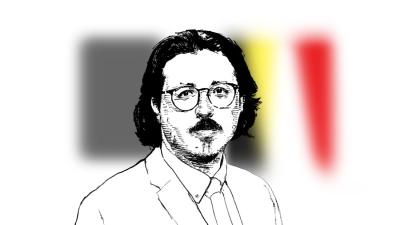

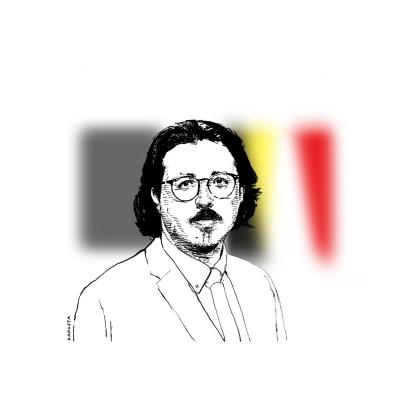
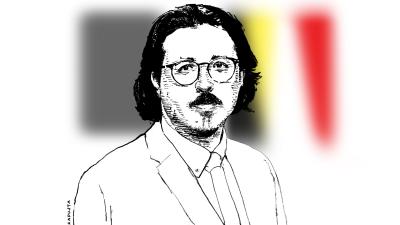

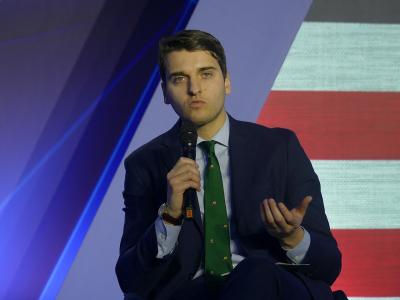

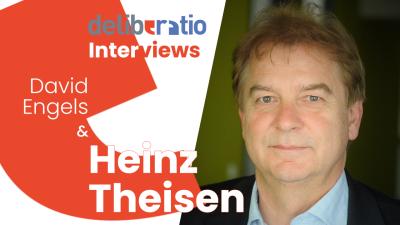

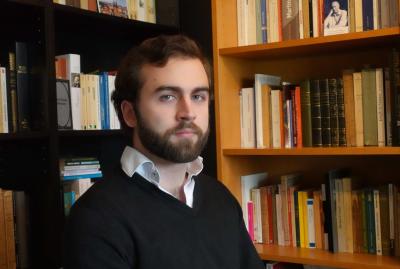

Comments (0)